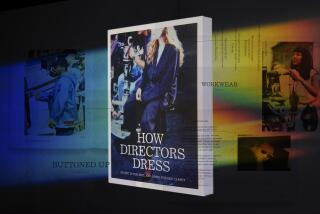DIRECTORS GUILD: HOLLYWOOD-STYLE PRINCES, PAUPERS
- Share via
The directors’ strike turned out to be a short subject instead of a feature or a miniseries. But the fact that it began at all will earn it more than an asterisk and a footnote in the history of Hollywood. And there is every reason to think that the directors, having learned how it works, will now be prepared to hit the macadam again sometime, if provoked.
It was, as all the stories said, the first time in its 51-year history that the Directors Guild of America had actually gone out on strike--if only, here on the West Coast, for a matter of minutes.
But the strike has uncommon significance, because the directors have always appeared to be the lords of Hollywood, such absolute monarchs on the set that we and they could forget they are subject to kings as well.
Then again, in labor relations as in much else, life in Hollywood is not quite like life anywhere else--almost, but not quite.
From its earliest days, the sums that the film industry paid not only to its executives and stars but to its top directors and writers have been so boggling that the line between capital and labor seemed invisible.
During the anti-communist fervors that racked Hollywood in the ‘50s and before, there were snarls about the poolside Marxists, preaching against capitalism from their costly patios in Brentwood.
At two grand a week, it might have been difficult to think of yourself as a wage slave; difficult but not impossible. It did not take Hollywood’s writers long to realize that they had no control over the integrity of their work, let alone their claims to screen credit for what they had written, and that there were wide disparities between what the best-paid and worst-paid writers received.
It was only in 1941, after a long and bitter struggle, complicated by ideological stresses (right versus left) within the membership, that the Writers Guild of America finally won recognition from the studios. The screen actors, who had their own frustrations, had gained recognition in 1937, after threatening to strike.
In the late 1930s, the directors, too, realized that although they might live in Bel-Air, wear jodhpurs and carry swagger sticks, they were still subject to management and had no recourse when across-the-board wage cuts were announced, as they were.
King Vidor liked to remember the night he and a dozen or so of his fellow directors, all equally potent and respected, gathered on the sidewalk outside a Hollywood hotel and agreed among themselves that something had to be done and that they should meet again to do it. From that sidewalk chat, in 1936, came the Directors Guild of America, now several thousand strong with the inclusion of assistant directors and television floor managers.
Hollywood’s craft unions, its cadres of carpenters, electricians and other technicians, had their own organizing troubles in an industry which from the start embraced to a fare-thee-well a go-get-’em, damn-the-torpedoes, laissez-faire free enterprise.
In the early ‘30s, the strike-breaking tactics against the craft unions followed the often-violent patterns in auto, steel and other industries. Ironically, the two men most instrumental in winning recognition for the umbrella union of crafts, the IA, proved to be labor racketeers, dealing secretly with management.
William Browne and Willie Bioff, who was said to have had Capone connections in Chicago, were convicted of extortion and went to prison in 1941. Joseph Schenck, then the head of 20th Century-Fox, was convicted of perjury in connection with a $100,000 bribe he had paid the two men.
The Writers Guild learned to strike earlier than the Directors Guild, although its most recent walkout two years ago revealed a sharp schism along the old fault line of conservatives versus activists, new guard versus old guard. (Under new guidance within the guild, the schism appears to be healing.)
The problems of cohesive strike action in both the writers and directors camps is complicated, technically and emotionally, by the rise of the hyphen. Writers may be writer-producer-directors; directors may be director-producer-writers, everybody doubling as the hirers and the hired. The right hand may find itself negotiating with the left hand.
In several ways, the short-lived strike measured the ongoing changes in the industry. The old-style moguls, economic royalists to a man, have walked off into history, carrying mixed reviews. The new breed of highly paid easily movable studio leaders have college-trained negotiators to oversee their labor relations--and so do the guilds. Both sides deal with issues of enormous complexity, and with future financial ramifications that even the most clearsighted can’t discern for certain.
But, after these and the other complexities have been admitted--and as the membership of the Directors Guild seems to have accepted overwhelmingly--the line between management and labor can be discovered after all--even if a minor king might envy what some of the laborers get.
More to Read
The biggest entertainment stories
Get our big stories about Hollywood, film, television, music, arts, culture and more right in your inbox as soon as they publish.
You may occasionally receive promotional content from the Los Angeles Times.










